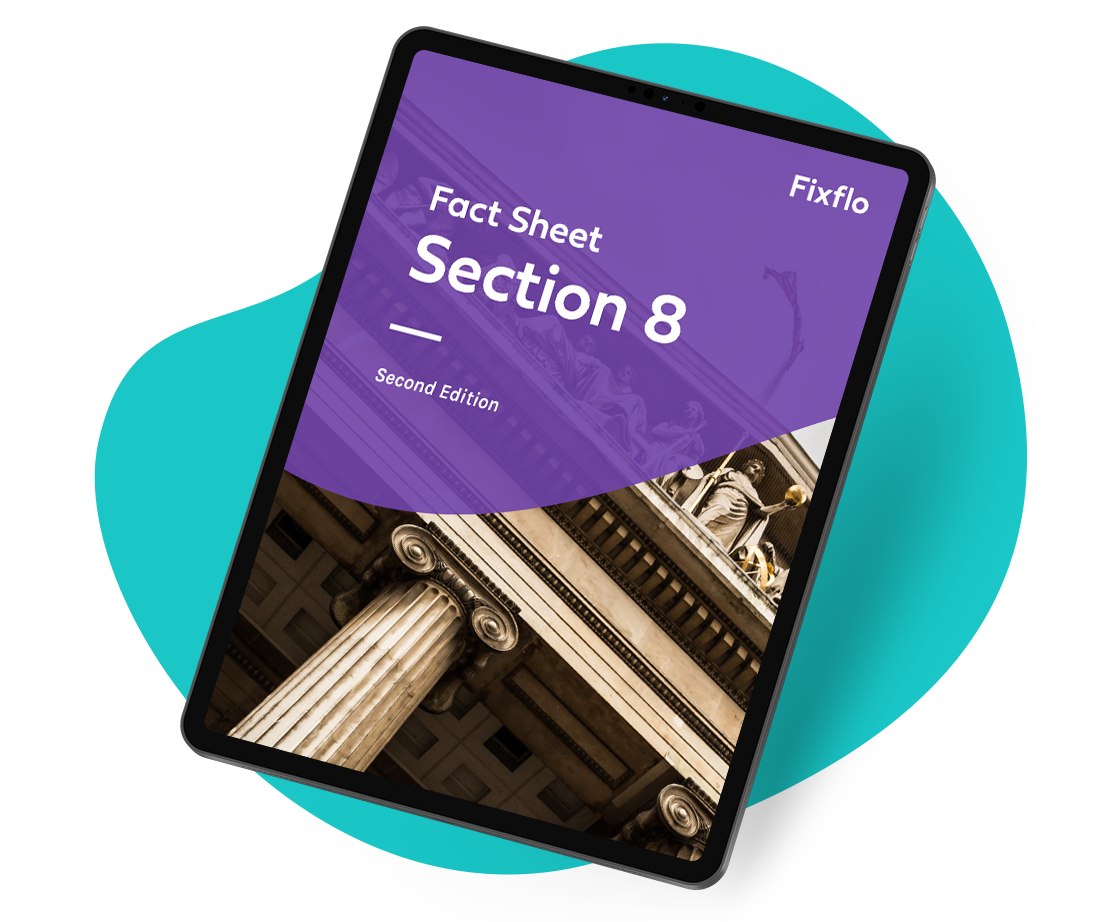Section 8 of the Housing Act 1988 allows a landlord to terminate a tenancy; however, unlike Section 21, it requires certain circumstances. It can be served at any point during an assured shorthold tenancy, or before the contract ends.
With the possible abolition of Section 21 as part of expected upcoming rental reforms, knowing Section 8 of the Housing Act 1988 inside and out has become even more imperative.

Why is a Section 8 eviction notice served?
A Section 8 notice is used to evict tenants who have broken their tenancy agreements. They may be:
- tenants who may have damaged the property
- tenants who have fallen into rental arrears
- tenants who are using the property for criminal activities
The notice could also be issued if a landlord wishes to change the use of the property for:
- redevelopment
- the landlord to live there
- the use of the property as a holiday or student let.
What are the grounds of Section 8 evictions?
There are eight mandatory grounds for a Section 8 eviction, followed by nine discretionary grounds. The difference between these determines the court process. The court must uphold mandatory grounds, providing the landlord gives sufficient evidence. However, the court can evaluate the landlord's claims for discretionary grounds.
New grounds have been proposed under the Renters' Rights Bill. Discover these changes in our Renters' Rights Bill Explainer Guide.
The mandatory grounds include:
If the landlord has occupied the property as their main home before the tenancy and has given notice of their intention to return.
If a mortgage lender wishes to repossess the property and requires it to be vacant for sale. The mortgage must have been taken out before the tenancy began.
If the property was previously used as a holiday let on a fixed term of up to eight months, and the landlord wishes to return it to holiday let use, usually during the summer.
If the property has previously been used as a student let, and the landlord wishes to repurpose it. The tenancy must have been fixed for less than 12 months to apply.
If the property is owned by a religious body or minister of religion such as a bishop or priest and it is needed for use.
If the landlord wishes to reconstruct or demolish the property or a substantial part of the building and the work cannot be undertaken while a tenant lives there. The landlord could be liable for moving costs.
If the tenant dies. The landlord can claim possession where proceedings are commenced within one year of the death. This becomes null and void if there is a living spouse.
If the tenant exhibits anti-social behaviour, including noise, criminal behaviour, or breach of an injunction.
If one of the tenants does not have the right to rent in the UK due to their immigration status, as notified by the Home Office.
If the tenant is in serious rent arrears. If they owe a minimum of eight weeks’ rent if they pay weekly or fortnightly, two months if paid monthly, and three months if paid quarterly or annually.
The discretionary grounds include:
If the landlord seeks to regain possession of their property but is to provide alternative accommodation for the tenant, this must meet specific criteria. For example, if the old property was furnished, the new one must be, too.
If the tenant is in rent arrears, but less than those specified in ground 8. This ground allows for rent recover by distress.
If the tenant has persistent delays in paying their rent.
If the tenant breaches any part of their tenancy agreement. This doesn't include rent arrears.
If the tenant has damaged the property through neglect.
If the tenant uses the property for immoral or illegal activities, such as domestic violence or drug dealing.
If one of the tenants has left the property due to being a victim of violence or threats of violence perpetrated by their partner, who also lived in the property.
If the tenant or an adult residing in the property has been convicted of an indictable offence which took place during, and at the scene of, a riot in the United Kingdom.
If the tenant damages the furniture provided by the landlord.
If the tenant rented the property while working for the landlord but they have since left their employ.
If the tenant has rented the property due to a false statement they have knowingly or recklessly made.
Want to know more about how Section 8 differs from Section 21 evictions?
How is a Section 8 eviction notice served?
To serve the eviction notice correctly, the landlord must list the specific grounds of eviction on the notice and provide proof that these grounds apply to the tenant. A Section 8 notice can cite multiple grounds for eviction, including both mandatory and discretionary reasons.
Landlords can do this by downloading Form 3 from the government website, which will also require them to fill out the length of the notice period. The notice can be delivered by post, through the letterbox or in person, depending on the terms detailed in the tenancy agreement.
It is important to fill it out correctly because any discrepancy in the details you provide could lead to the nullification of the case. It's also worth keeping an audit trail of the actions you have completed and when as this could become useful if the case goes to court.
If the tenant signs and returns the form, the required notice period lapses and they are still residing in the property, you can file for proceedings in court. This can be done online or a form can be downloaded to serve in person at the courts.
How long is a Section 8 notice period?
The notice period refers to how long the tenant has to vacate the property, and it can vary. It can be anything from immediate to two months, but it can be extended depending on whether the eviction notice is valid or if there is an issue with the leaving date.
However, a landlord can claim a possession order in the courts if the Section 8 notice is valid and the tenant does not leave the property in time. Court proceedings can extend the amount of time before a tenant must be out of the property, but if possession proceedings are undefended it is usually up to three months.
What if the courts rule the tenant can stay in the property?
Though the courts may decide a tenant can stay in the property, this does not mean that they can continue residing there without certain conditions. The courts could decide to suspend the possession order. For example, if the problem was that the tenant was not paying their rent on time, they could be ordered to pay the arrears.
However, suspending a possession order is only possible if the landlord has used any of the grounds nine to 17 since they are discretionary.
Otherwise, the landlord's case could be dismissed, meaning the tenancy would continue without needing to meet any conditions. This could be due to incorrect information or a lack of evidence in the form.
What if the courts rule the tenant has to leave?
A tenant would not have to leave immediately but have 14 days or longer to vacate the property. The court then issues a notice to the tenant specifying the amount of time they have to leave, which is an outright possession order.
The tenant can appeal the decision and suspend the possession order; however, this is only if they can prove that mistakes were made during the possession hearing.
What if the tenant doesn't leave after a court ruling?
If the tenant refuses to leave after the specified period of time, the landlord must get an eviction warrant from the court. This would result in enforcement officers, otherwise known as bailiffs, showing up at the tenant's door to force them out. But this can only happen after the bailiffs have given 14 days' notice of eviction, with a date and time specified.
Find out what Paul Shamplina, Founder of Landlord Action, had to say about Section 8 here.
Final thoughts
Understanding Section 8 evictions is crucial. With the potential scrapping of Section 21, it will likely become the primary method for landlords to regain possession of their properties. By familiarising yourself with these regulations, you can ensure smoother processes and avoid legal complications when issuing a Section 8.
Looking for more like this?
Visit our Content Hub to find guides, blogs, webinars and more on the latest topics in lettings.
Disclaimer: Nothing on this site constitutes legal advice. Specialist legal advice should be taken in relation to specific circumstances. The contents of this site are for general information purposes only no warranty, express or implied, is given as to its accuracy and we do not accept any liability for error or omission. We shall not be liable for any damage (including, without limitation, damage for loss of business or loss of profits) arising in contract, tort or otherwise from the use of, or inability to use, this site or any material contained in it, or from any action or decision taken as a result of using this site or any such material. Some of the material on this site may have been prepared some time ago so it may not reflect the up-to-date position of any relevant law.
Keep reading...
Read more on
#{ item.name }
|
No posts available
Be the first to hear about new content for Property Managers.
eBooks and webinars, always free
- Data-driven industry insights
- Compliance and legal updates
- Property management best practices



